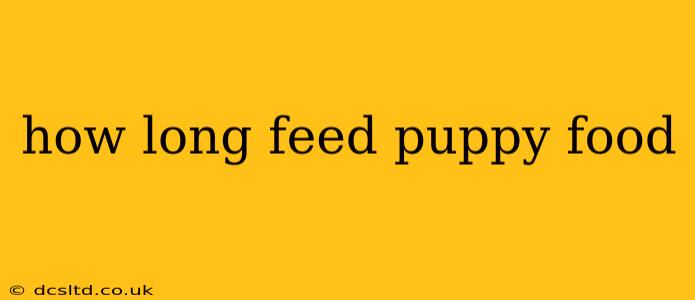How Long to Feed Puppy Food: A Comprehensive Guide
Choosing the right food and knowing how long to feed it to your puppy is crucial for their healthy development. This isn't a one-size-fits-all answer, as it depends on several factors including breed, size, and individual growth rate. Let's delve into the specifics to ensure your furry friend thrives.
What Breed is Your Puppy?
Larger breeds mature more slowly than smaller breeds. Great Danes, for example, reach their adult size much later than Chihuahuas. Large breed puppies generally need to stay on puppy food for longer, sometimes up to 15 months or even 18 months, to support their sustained growth and development. Smaller breeds might transition to adult food as early as 8-12 months. Always check the recommendations on your specific puppy food packaging, as this provides a good starting point.
How Big is Your Puppy?
Size plays a significant role in determining the duration of puppy food feeding. Giant breeds, as mentioned, require a longer period on puppy food due to their extended growth phase. Their bodies need the higher calorie and nutrient density provided in puppy food to support their rapid growth and development of strong bones and joints. Smaller breeds, on the other hand, often reach adult size quicker, and the transition to adult food happens sooner.
Individual Growth Rate: Every Puppy is Unique
Even within the same breed, individual puppies grow at different rates. Some may be larger and mature faster, while others develop more gradually. Monitor your puppy's growth and body condition. A healthy puppy should have a well-defined waist and ribs easily palpable, but not visible. If your puppy seems to be growing too quickly or too slowly, consult your veterinarian. They can assess your puppy's development and provide personalized advice on the best feeding schedule.
What Does the Puppy Food Packaging Say?
The food manufacturer's recommendations are a valuable starting point. Most puppy food packaging will specify an age range (e.g., "for puppies up to 12 months") or a size (e.g., "for small breeds"). However, always consider this guideline in conjunction with your puppy's individual growth and development, as discussed above.
Signs Your Puppy is Ready for Adult Food
Several indicators suggest your puppy might be ready for the transition:
- Slowed Growth: Noticeably slower weight gain compared to earlier months is a common sign.
- Adult Teeth: Most puppies have their adult teeth by around 6-8 months, although some breeds take longer.
- Veterinarian Recommendation: Your vet can assess your puppy's development and advise on the appropriate time to switch food.
How to Transition to Adult Food
Switching food abruptly can upset your puppy's digestive system. A gradual transition over 7-10 days is recommended. Start by mixing a small amount of adult food with their puppy food and gradually increase the proportion of adult food over the transition period.
What Happens if I Keep My Puppy on Puppy Food Too Long?
Prolonged feeding of puppy food can lead to obesity and other health issues. Puppy food is formulated for rapid growth and contains higher calorie and nutrient levels than adult food. Feeding it to an adult dog can lead to weight gain and put stress on their joints.
What Happens if I Switch to Adult Food Too Soon?
Switching to adult food too early could potentially stunt your puppy's growth or lead to nutrient deficiencies, especially for large or giant breeds. Their bodies need the higher nutrient density provided in puppy food to support their rapid growth.
Remember, consulting your veterinarian is crucial. They can assess your puppy's individual needs and recommend the best feeding schedule and food type to ensure optimal health and development. Don't hesitate to ask them any questions you have about your puppy's nutrition.
